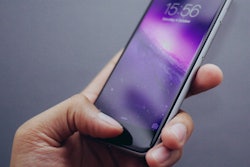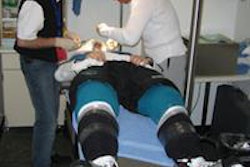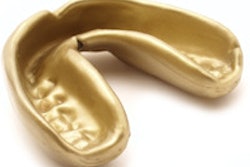High school football players wearing store-bought, over-the-counter (OTC) mouthguards were more than twice as likely to suffer mild traumatic brain injures (MTBI)/concussions than those wearing custom-made, properly fitted mouthguards, according to a new study in General Dentistry (May/June 2014, Vol. 62:3, pp. 34-38).
"Researchers and, most importantly, parents, are looking for ways to better protect children against concussions," said lead author Jackson Winters, DDS, a pediatric dentist who also served as a high school and collegiate football official for 28 years, according to a press release. "Consumers may believe that today's advanced helmet design provides sufficient protection, but our research indicates that, when compared to over-the-counter versions, a custom-made, properly fitted mouthguard also is essential to player safety."
The study followed 412 players from six high school football teams. Three teams (220 athletes) were randomly assigned to wear custom-made mouthguards, and three teams (192 athletes) wore standard OTC mouthguards of their own choosing. All players wore the same style of football helmet.
The study found that 8.3% of athletes in the OTC mouthguard group suffered MTBI/concussion injuries. For those with custom-made mouthguards, however, the rate was only 3.6%.
Many variables contribute to MTBI/concussion injuries, and mouthguards -- whose primary function is protecting the teeth -- cannot completely prevent them from occurring. Previous studies have theorized that mouthguards can reduce concussion risk because they help absorb shock, stabilize the head and neck, and limit movement caused by a direct hit to the jaw.
Mouthguard thickness also has been shown to be a factor that contributes to the level of protection. The average thickness of the custom-made mouthguards in this study was 3.50 mm, while the average thickness of the OTC mouthguards was only 1.65 mm.
"The benefits of protecting your child far outweigh the costs associated with a dental or medical injury, which is likelier to occur with a store-bought model," Dr. Winters said.
Custom-made mouthguards can also last longer than store-bought models and may be less prone to damage by the athletes, said Academy of General Dentistry spokesman Eugene Antenucci, DDS. "Over-the-counter mouthguards are not fitted to the athlete's mouth, making them less comfortable than custom guards made by a dentist," he said. "When a mouthguard is not comfortable, the athlete is likely to chew it, reducing its thickness and resulting in less protection."
Dr. Antenucci offers the following tips for caring for custom-made mouthguards:
- After each use, brush the mouthguard with a toothbrush and cool (not hot) water.
- Keep mouthguards in a well-ventilated, plastic storage box when not in use. Dentists will provide a case for mouthguards.
- Heat is bad for mouthguards, so don't leave it in direct sunlight or in a hot car. Heat can melt mouthguards, altering the way it fits and resulting in less protection.
- When seeing a dentist, bring mouthguards so the dentist can give it a thorough cleaning and check its structure and fit.
- Call a dentist with concerns about mouthguards.
Custom-made mouthguards are available from general dentists.



















